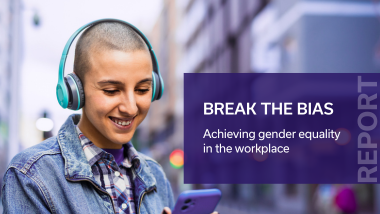How to get more men talking about mental health

In 2018, two friends, BBC News editor and mental health campaigner Matthew Shaw and City broker turned life coach Anthony Astbury founded the Whole Man Academy—a community where men get together to talk mindset, mental strength and male identity in the 21st century.
We caught up with Matthew Shaw ahead of our Male Mental Health in a Time of Uncertainty webinar to find out how we can get more men talking about their own mental health and what employers can do to encourage these conversations.
What led you to create the Whole Man Academy?
Both of us had experience of talking to people about both mental health and physical wellbeing and the issues that come from those areas. And we both realised these sessions were more attended by women than men. Women were far more engaged. We asked ourselves how we can attract men to have these conversations.
We decided we wanted to create a cool, sociable, aspirational space for men to talk about the issues that matter to them. We wanted to create safe spaces that aren’t like a therapy group but something they can look forward to attending. It’s easier to tell people you’re popping along to see David Gandy speak about mental health and wellbeing over drinks on Saville Row than saying you’re going to a discussion about male depression. We are getting to the same goal, which is men thinking more about their mental health.
Why do you think mental health among men is so topical in the UK right now?
The statistics are out there, and they are terrifying – the number of young men that are taking their own lives and that in itself is a shock to see. Recently, in the media, soap operas, in dramas, even the Royal Family have drawn attention to mental health. I think the conversations have started and people are realising something has to be done about this. But we need to encourage more men to join in on these conversations and eliminate the stigma around talking about how they are feeling, which doesn’t have an impact on their role as a father, brother, friend, boss, partner. I’m not saying women have it sorted or have it easier – but women are better at creating more social activity around their wellbeing than men do.
From running your events at the Whole Man Academy what has surprised you about what men are willing to talk about?
At the Whole Man Academy, we aim to bring men of all backgrounds and sexualities together to share their experiences and learn from each other. As men today, we share a lot more than we ever have—we’re husbands and fathers and we’re more open to sharing those experiences. Men feel freer to be more honest when they hear someone else’s story. It gives them permission to open up, and when they do open up it’s usually in a big way.
Having honest conversations, whatever your gender, is the way forward. Everyone can be involved in male mental health. If everyone gets involved it supports the men in your organisation and gets people together.
You’re very involved with the mental health advocacy community where you work at the BBC. How did that come about?
I had a period of depression in 2014 and my manager and the BBC dealt very well with my situation and my transition back into work. Back then, I realised I wouldn’t know what to do if someone came to me and said they had worries about their mental health. I wanted to learn more about the programmes and support on offer within the organisation. That began a journey into finding out more on the subject. In 2016, I worked on a project with the University of Michigan researching how organisations can create successful plans to beat the stigma of depression at work.
What did you discover from your research?
Get the person at the very top to support the cause. It can have a very transforming effect. Our Director of News helped us champion our goal to become an organisation that is open about talking about mental health. From there, we were able to find people throughout BBC News who were willing to speak about their experiences so others could directly relate to them. Don’t limit your advocates to those who have suffered with mental health issues—you need people from all walks of life that your staff can relate to, from different departments and varied levels of seniority.
What advice can you give people leaders who are trying to build more advocacy around mental health within their organisations?
People are still terrified to ask their colleagues if they are okay. Creating an environment where it’s encouraged to have open conversations is key.
Think about where in your current processes you can insert opportunities to have conversations about mental health - but try to have this separate from conversations about performance reviews or appraisals. Include open questions about mental health within your employee engagement surveys. For instance: ‘What can we do better to make this company a better place to work for your mental health and wellbeing?’ The more we have the discussions the more realistic people’s responses will be.
In news, when trauma happens, we act a lot faster and a lot more carefully to make sure everyone in the organisation is doing okay and that they have access to the help they might need. Every workplace is different. You need to find out what your people need to feel supported and what your colleagues will respond to.











